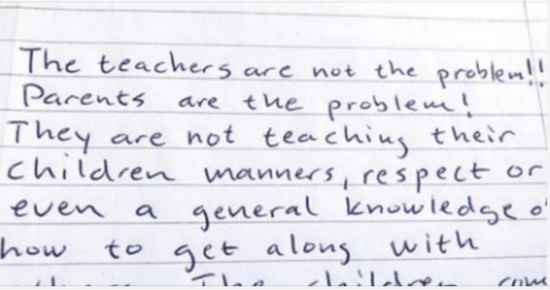Education holds a significant place in our lives, especially for the young minds gearing up for the future. While teachers often play a crucial role in shaping these futures, they find themselves overwhelmed and under-compensated.
Many embark on this noble profession driven by a passion to enlighten and inspire the next generation. Unfortunately, as time goes by, some become disillusioned and overburdened, attributing their burnout to a mix of challenges. One common source of frustration among teachers often relates to their interaction with students’ parents.
Back in 2017, a retired teacher penned a poignant piece for a newspaper, sharing her classroom struggles. Her words have since resonated online, becoming a testament to the frustrations experienced by many teachers today who find her observations relevant.
Parents Hold the Key
Lisa Roberson, the retired teacher, forwarded her thoughts to the Augusta Chronicle. Her comments continue to stir discussions on the lasting question: Who bears more responsibility for the issues plaguing the educational system, parents or teachers? Considering the aftermath of the pandemic, shifts to virtual learning, and students’ adjustment to traditional schooling, Roberson’s views might carry even more weight today.
“As someone who used to teach, it frustrates me to hear people out of touch with the current schooling systems deciding what’s best,” she began. “The teachers aren’t the problem. It’s the parents.”
She elaborated on how some parents don’t adequately prepare their children for learning. “Parents aren’t teaching their kids manners, respect, or basic social skills. Children may wear expensive shoes yet lack basic school supplies like pencils or paper. Who ends up providing them? More often than not, it’s the teachers, out of their own pockets,” she stated, highlighting the financial burdens teachers bear. “For failing schools, examine the involvement of parents and students. Do parents attend school events? Do they maintain communication with teachers regularly?”
Her challenges arose from children lacking required materials and inattentiveness in class. “Are children doing their homework consistently or creating disruptions? Reflecting on these aspects reveals that it is often not the schools that are failing, but rather, the parents,” she emphasized. “Teachers cannot fulfill both their own duties and those of the parents. Improvement requires parents actively contributing!”
Building a Bridge Between Parents and Teachers
Ideally, both educators and parents would work in perfect harmony. However, the pandemic changed the dynamics, urging parents to become more involved in their children’s learning.
This increased scrutiny spurred debates on broader issues like vaccinations, identity, educational content, school closures, and other hot-button topics.
Nevertheless, both sides have a mutual aim: to furnish young learners with a solid educational foundation, enhancing their future prospects. Teachers need to convey this knowledge effectively, perhaps through inventive methods that resonate with students and spark their interest. Meanwhile, parents play a crucial role in ensuring their children are ready to learn by instilling routines, respect, and responsibility.
However, a myriad of factors may limit how involved parents can be in their children’s education. Conversely, excessive parental involvement can also pose challenges, potentially even more so.
“Ghost parenting impacts certain students, yet helicopter parenting significantly contributes to current issues,” notes Scott A. Roth, PsyD, a certified school psychologist from New Jersey.
“Children who haven’t experienced disappointment because their parents shield them may grow up mistrusting their ability to overcome challenges independently,” he adds.
The relationship between parents and teachers is more complex than ever before. During the pandemic, some students lagged compared to their classmates. The ongoing teacher shortage exacerbates the exhaustion and burnout of teachers who remain dedicated. Many educators believe that student behavior has worsened post-pandemic, rendering once-effective teaching strategies inadequate.
“The pandemic disrupted routines for families, teachers, and students. Even in places without extended school closures, home routines were affected, making it difficult for young minds,” explains Brandi David, MEd, a specialist in K-8 education and development editor based in Florida.
Nurturing Connections
There might be a shared agreement between parents and teachers on the need for educational evolution. The traditional educational framework is yet to address modern challenges effectively.
Curriculum enhancements, equity, life skills training, and integrating technology are areas in need of improvement, according to Patricia A. Edwards, Ph.D., an esteemed professor at Michigan State University specializing in family literacy.
“Efforts are underway to respond to these critiques, modernizing curriculums, personalizing learning, expanding tech usage, and moving away from standardized tests,” Dr. Edwards noted. “These changes aim to equip K-12 education with tools for contemporary challenges.”
Meanwhile, enhancing children’s educational experience calls for collaboration between parents and teachers. “Developing a robust parent-teacher relationship ensures student accountability,” shares David. “Teachers should openly communicate practices that work, such as calming steps, breathing exercises, and behavior management opportunities.”
“Building relationships is crucial,” reiterates Dr. Roth. “When students feel valued and safe, their learning and behavior improve significantly.”




